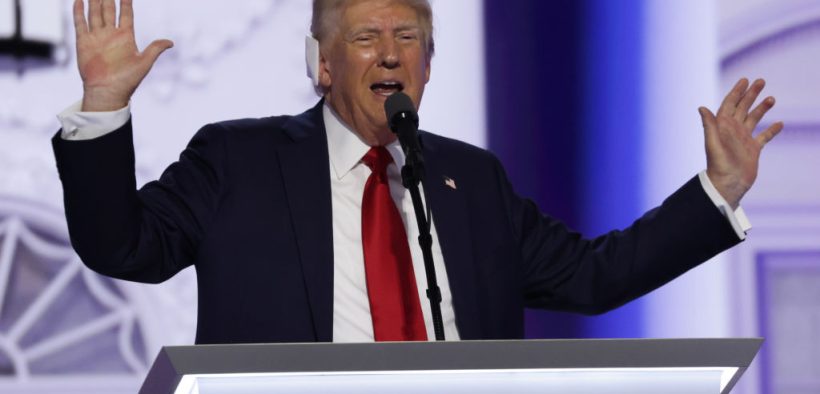Why Did Trump Give a Bad Speech?
Share

Donald Trump filibustered his own nomination Thursday night—and Friday morning, too: His 90-minute acceptance remarks didn’t finish until well after midnight Eastern time. Pundits were astonished. If President Joe Biden can’t speak for fifteen minutes without mangling names and slurring his words, Trump can’t discipline himself to get his point across in less than an hour. Democrats who had been feeling hopeless heard Trump and, for the first time in weeks, thought he could be beaten, maybe not by Joe Biden but by someone under 70 with an average amount of political talent.
Yet Trump knew exactly what he was doing. The speech was prepared well in advance, even if ad-libbing added quite a bit to its length. Trump wanted to accomplish something with these remarks. But what?
The speech itself was bland, but for its opening section about the July 13 attempt on Trump’s life. Trump recounted his inch-away-from-death experience and praised the heroism of Corey Comperatore, who died shielding his daughters from the assassin’s bullets. Comperatore was a volunteer firefighter, and his uniform was displayed on stage. Trump kissed its helmet.
After that, however, the speech had little focus. This was not a unity speech, although unity did get passing attention: “I am running to be president for all of America, not half of America, because there is no victory in winning for half of America.” Trump recapitulated many of the convention’s standard Republican themes: tax cuts, energy independence (now reconceived as “energy dominance”). Immigration, and the policies of countries which cut their crime rates by sending their criminals to the United States, came in for extended criticism. But no single thread tied the 90-minute monologue together. Nor did many lines stand out as particularly memorable.
Several commentators noted afterward that if nothing else Trump proved he has sheer physical stamina—and mental acuity—that Joe Biden lacks. Trump may be only a few years younger than Biden, but Trump has the energy of a much younger man. And maybe that’s what he intended to show off.
This speech was not just about striking a contrast with Biden, however. It was a rebranding for Trump, and a neutralization of another Donald Trump, the one Democrats have tried to establish in voters’ minds.
That Trump is an angry, hateful man linked to political violence, above all the January 6, 2021 riot at the U.S. Capitol. He’s a figure whose harsh rhetoric inflames the nation’s divisions. Trump, as described by his enemies, is dangerous.
The Trump who delivered such long-winded acceptance remarks at the convention, on the other hand, is not dangerous. Trump was genial and jokey the whole time he gave his speech—no anger, no thunder. His remarks weren’t utterly anodyne; he used much of his familiar boilerplate about immigration, for example, rather than softening his words. But with so many words flowing from his smiling face, the speech’s effect was to convey moderation even if the language didn’t do so explicitly.
In short, Trump was drowning his own infamy in a sea of words, without repudiating any of his policies or greatly moderating his language. Those moves could have cost him support—not much, perhaps, but enough to matter in a close election like 2016 or 2020. Trump knows that 2024 is likely to be close, too. He can’t afford any defections from the right, but he can’t let himself be seen as an ogre by undecided voters either. A prolix acceptance speech, rather than an ideologically watered-down one, would reassure “normies” without demoralizing conservatives. That’s important, considering the damage to conservative morale already inflicted by the changes Trump demanded to the Republican platform.













